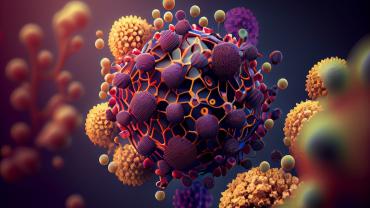
Inflammatory bowel disease (IBD) is a term for two chronic, autoimmune diseases in the gastrointestinal (GI) tract: Crohn’s disease and ulcerative colitis. Research is investigating the potential connection between IBD and histamine intolerance, which affects approximately 1% of the total population, of which 80% are middle-aged.
What is histamine intolerance?
Histamine intolerance (HIT) is similar to lactose intolerance and is characterized by a deficiency of diamine oxidase (DAO) enzymes. In the GI tract, DAO is the primary enzyme that metabolizes and degrades histamine. DAO is located at the apical end of mature villous cells in the GI tract. It is proposed that DAO activity can reflect the small intestinal mucosa's integrity and maturity.
HIT can result in insufficient histamine degradation and elevated plasma histamine concentrations. Consumption of histamine-containing foods in individuals with HIT may result in nonspecific, undesirable symptoms, such as GI complaints (i.e., bloating, postprandial fullness, abdominal pain) or headaches. HIT may result from genetic polymorphisms, certain medications, or inflammatory or GI disorders. Human clinical studies by Schnedl et al., Izquierdo-Casas et al., and Manzotti et al. demonstrate that patients with HIT who were administered DAO supplements exhibited significantly improved HIT-related complaints.
What foods contain histamine?
Histamine is a biogenic amine that can be synthesized endogenously or obtained exogenously and has various roles in the body. Many foods contain moderate-to-high histamine levels, such as alcohol, fish, meat, fermented foods, cheese, and certain fruits and vegetables. Histamine concentrations of a food product can vary based on manufacturing processes, hygiene of raw materials, microbial composition, and fermentation duration. Due to the vast and variable distribution of histamine-rich foods, adhering to a histamine-free diet may be challenging and increase the risk of nutrient deficiencies.
What is the connection between histamine intolerance and IBD?
The exact mechanism underlying the connection between histamine, histamine-associated signaling pathways, and inflammatory responses in patients with IBD remains unclear. However, research suggests that dysregulated histamine homeostasis may be associated with IBD etiology and pathogenesis.
Human and animal studies suggest that a DAO deficiency may correlate negatively with intestinal barrier dysfunction and colonic inflammatory responses. Some studies propose that DAO activity could potentially be considered a marker of intestinal mucosa integrity of the small intestine, though more research is needed.
In patients diagnosed with IBD, it was observed that the histamine content and secretion of affected mucosa were significantly increased, which could potentially be associated with a DAO deficiency. Among 115 patients, those with IBD had significantly lower serum DAO activity than controls, regardless of disease activity level. Notably, serum DAO activity was significantly lower in patients with ulcerative colitis in whom small intestinal inflammation was not involved compared to healthy controls.
Conclusion
Although more research is needed on the exact mechanism, evidence suggests a connection between HIT and IBD. Since HIT is known to originate in the gut, promoting normal histamine homeostasis may benefit overall GI health and function and vice versa.
By Danielle Moyer Male, MS, CNS, LDN